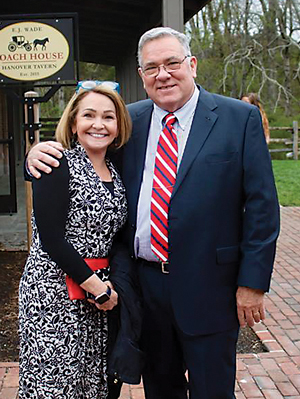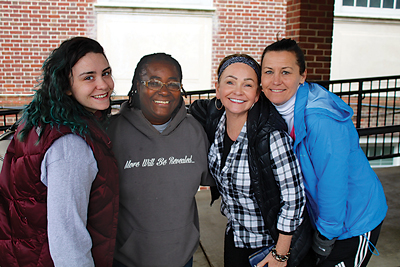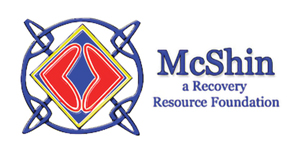Newspaper clippings, photo collages, and resource flyers cover the hallways of The McShin Foundation in Henrico. It’s apparent this is not a typical treatment center with a clinical feel. There is a homey authenticity to the building and to the staff. One by one, participants gather into the group room, circle up their chairs, and start their day.
“I used to be homeless. I walked into McShin and was put into a recovery house that same day,” says 21-year-old Stephen Worthington. “I received groceries, a bed, and a chance.” He shares his experience with a huge smile on his face. “Today, I have hope.”
Stephen came to McShin because his substance use disorder had taken him to the point of homelessness and at the risk of death. When he was ready, Stephen reached out to his mother to tell her that he wanted help. Today, Stephen receives peer-to-peer recovery support services. He is part of the McShin network of alumni who have experienced support, an introduction to community, and the tools to begin building the foundation of recovery while participating in McShin’s residential recovery program. These are mothers, fathers, sisters, children, husbands, and friends who found themselves at a point of desperation and isolation. “What makes their stories different from the stories shared from communities around the country about the devastation of addiction is that these people found hope for a new life,” says Erin Mayberry, who serves as director of female programs at McShin. “This hope was recovery.”
 Founded in 2004 by Carol McDaid and John Shinholser (the Mc and Shin respectively), McShin uses a peer-to-peer approach to recovery from substance use disorders. Program participants learn to live without the use of drugs or alcohol, to replace a negative mindset with gratitude, and to abandon self-centered behavior for service to others. Payment for McShin’s residential program varies, and generally, fees are based on the level of services needed and a person’s ability to pay.
Founded in 2004 by Carol McDaid and John Shinholser (the Mc and Shin respectively), McShin uses a peer-to-peer approach to recovery from substance use disorders. Program participants learn to live without the use of drugs or alcohol, to replace a negative mindset with gratitude, and to abandon self-centered behavior for service to others. Payment for McShin’s residential program varies, and generally, fees are based on the level of services needed and a person’s ability to pay.
“Days at McShin are filled with peer groups, 12-step meetings, responsibilities, laughter, tough conversations and a sense of belonging,” says Mayberry.
Since its inception, McShin has helped more than two thousand people begin their recovery journey. At McShin, participants find a sense of community, family, hope, and purpose. Through McShin’s focus on community and healing, participants are given the opportunity to rebuild relationships while working on themselves.
Debbie Rosenbaum, the mother of a program alum, serves on McShin’s board of directors. She remembers what it was like when she was searching for help for her son. “My family was welcomed into this community of love, recovery, encouragement, advocacy, and education,” says Debbie, who adds that her son marked six years in recovery last month.
Mayberry says the authenticity and compassion of the McShin program sets it apart from other organizations and approaches to addiction treatment. Through the understanding that recovery cannot happen fully in twenty-eight days, McShin encourages a longer term, real-world approach to the process. This includes same-day access to recovery housing, peer-support services, and linkage to clinical supports, such as a medical detox and substance abuse counseling.

Stephen and Debbie are just two of the many people affected by McShin’s approach to addiction recovery who choose to share their stories with others. “These experiences are filled with hope and the message that recovery from substance use disorder is possible and available to those who are willing to work for it,” says Mayberry.





